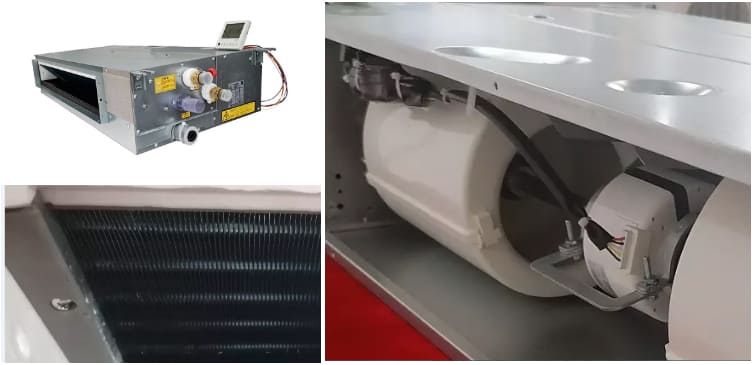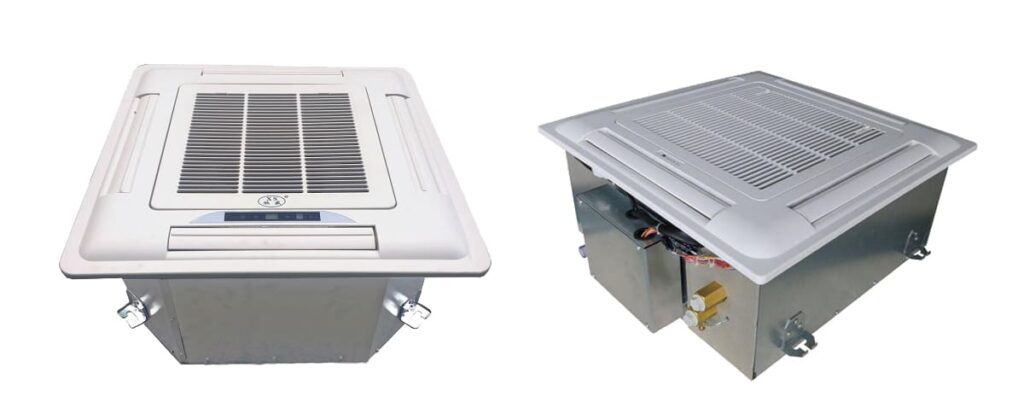Fan coil units, also known as FCUs, are heating, ventilation, and air conditioning (HVAC) systems commonly found in residential, commercial, and industrial buildings. These units are designed to circulate air through a building, providing both heating and cooling as required. In this blog, we will discuss how fan coil units work.
A fan coil unit comprises four primary components: a heat exchanger, a fan, a filter, and a heating or cooling source. The heat exchanger exchanges thermal energy between the air and a fluid such as water or refrigerant. The fan moves air over the heat exchanger, either blowing warm air into the room for heating or cold air into the room for cooling. The filter ensures that the air passing through the unit is clean and free from dust and other particles. Finally, the heating or cooling source provides the thermal energy necessary for the unit to operate.
Fan coil units first draw air from the room through the filter. The filter removes any dust or other particles from the air, ensuring that the air entering the unit is clean. The air then passes over the heat exchanger, which either heats or cools the air depending on the desired temperature. The fan then circulates the air back into the room, providing a steady flow of warm or cool air.
The fan coil unit is typically supplied with hot water from a boiler or another heat source in heating mode. The heat exchanger removes heat from the air passing over it, and the fan circulates the cooled air into the room. The heat exchanger transfers the heat from the hot water to the air death over it, and the fan then circulates the warm air into the room. In cooling mode, the unit is supplied with chilled water or refrigerant from a chiller or other cooling source.
Fan coil units are typically controlled by a thermostat, which maintains the desired temperature in the room by turning the fan and heating or cooling source on and off as required. Some fan coil units are also equipped with a damper, which can be adjusted to control the amount of air entering the unit and therefore the amount of heating or cooling provided.

The Importance of Fan Coil Unit Maintenance and Cleaning:
Fan coil units (FCUs) are essential to many commercial and residential HVAC systems. These units use a fan to circulate air over a heat exchanger, allowing them to regulate the temperature and humidity in a room. However, like any mechanical system, FCUs require regular maintenance and cleaning to operate efficiently and effectively.
There are several reasons why it is essential to maintain and clean your fan coil units regularly:
- Energy Efficiency: A dirty fan coil unit can reduce energy efficiency. The fan must work harder to circulate air over the heat exchanger, leading to higher energy consumption and bills.
- Indoor Air Quality: Fan coil units can be a breeding ground for bacteria, mold, and other allergens. When the unit is not cleaned regularly, these contaminants can circulate in the air, leading to poor indoor air quality, which can cause health problems for the building occupants.
- Equipment Lifespan: Regular maintenance and cleaning can help extend the lifespan of your fan coil unit. Dirty coils can lead to corrosion, damage to the unit and premature failure.
- Cost Savings: Regular maintenance and cleaning can prevent costly repairs and replacements. By detecting and addressing minor issues early on, you can avoid more significant and expensive problems.
What’s Involved in Fan Coil Unit Maintenance and Cleaning?
Fan coil unit maintenance and cleaning involve several steps, including:
- Visual Inspection: The technician will inspect the unit visually to check for any signs of damage, corrosion, or wear and tear.
- Coil Cleaning: The technician will clean the coils using a chemical solution that removes dirt, dust, and other contaminants. This process improves energy efficiency and indoor air quality.
- Filter Replacement: The technician will replace the filters, which can accumulate dirt, dust, and other pollutants. Clean filters ensure that the unit operates efficiently and improves indoor air quality.
- Lubrication: The technician will lubricate the fan motor, bearings, and other moving parts to ensure the unit operates smoothly and quietly.
- Electrical System Check: The technician will check the electrical System to ensure that all connections are secure and that the unit operates safely.
Regular maintenance and cleaning of fan coil units are essential to ensure optimal performance, energy efficiency, and indoor air quality. The process involves visual inspection, coil cleaning, filter replacement, lubrication, and electrical system checks. By investing in regular maintenance and cleaning, you can extend the lifespan of your unit, save money on energy bills, and ensure that the building occupants have a healthy and comfortable environment.

What types of contamination can affect fan coil units?
Fan coil units (FCUs) are commonly used in heating, ventilation, and air conditioning (HVAC) systems to provide temperature control within a building. However, fan coil units are vulnerable to contamination like any other HVAC component. Contamination can lead to reduced performance, energy inefficiency, and even health hazards.
Types of Contamination:
1. Microbial Contamination
Microbial contamination is the most common contamination that can affect fan coil units. This contamination can arise from the growth of bacteria, fungi, and other microorganisms in the System. When FCUs are not maintained or cleaned regularly, the moisture and organic matter in the unit provide a favorable environment for microbial growth. Microbial contamination can cause unpleasant odors, allergic reactions, and respiratory problems.
2. Particulate Contamination
Particulate contamination refers to the accumulation of dust, dirt, and other solid particles on the surfaces of the fan coil unit. These particles can come from outdoor air, construction dust, and other sources. Particulate contamination can affect the fan coil unit’s airflow and heat transfer efficiency, leading to increased energy consumption, reduced performance, and higher maintenance costs.
3. Chemical Contamination
Chemical contamination can occur when refrigerant, cleaning chemicals, or other chemicals are leaked into the fan coil unit. Chemical contamination can lead to the release of toxic gases, which can be harmful to occupants. Chemical contamination can also cause corrosion of the unit’s components, leading to reduced performance and increased maintenance costs.

Specialist HVAC and Air Hygiene Solutions:
To prevent contamination of fan coil units, it is essential to implement specialist HVAC and air hygiene solutions. These solutions include:
1. Regular Cleaning and Maintenance
Regularly cleaning and maintaining fan coil units can prevent microbial and particulate contamination. The cleaning process includes:
- Removing and cleaning the filters.
- Cleaning the coils.
- Disinfecting the surfaces of the unit.
Regular maintenance can also help identify potential problems early and prevent breakdowns.
2. Air Purification
Air purification systems can remove airborne contaminants, such as bacteria, viruses, and particulate matter, from the air. These systems can be integrated into HVAC systems, ensuring the air circulated through the fan coil unit is clean and healthy.
3. Leak Detection and Repair
Regular leak detection and repair can prevent chemical contamination of fan coil units. Leak detection systems can identify leaks in refrigerant lines or other components, enabling prompt repair and preventing the release of harmful chemicals into the air.
Conclusion:
Contamination of fan coil units can lead to reduced performance, energy inefficiency, and even health hazards. To prevent contamination, it is essential to implement specialist HVAC and air hygiene solutions, including regular cleaning and maintenance, air purification, and leak detection and repair. These solutions can ensure that the fan coil unit operates efficiently, providing a healthy and comfortable indoor environment.


